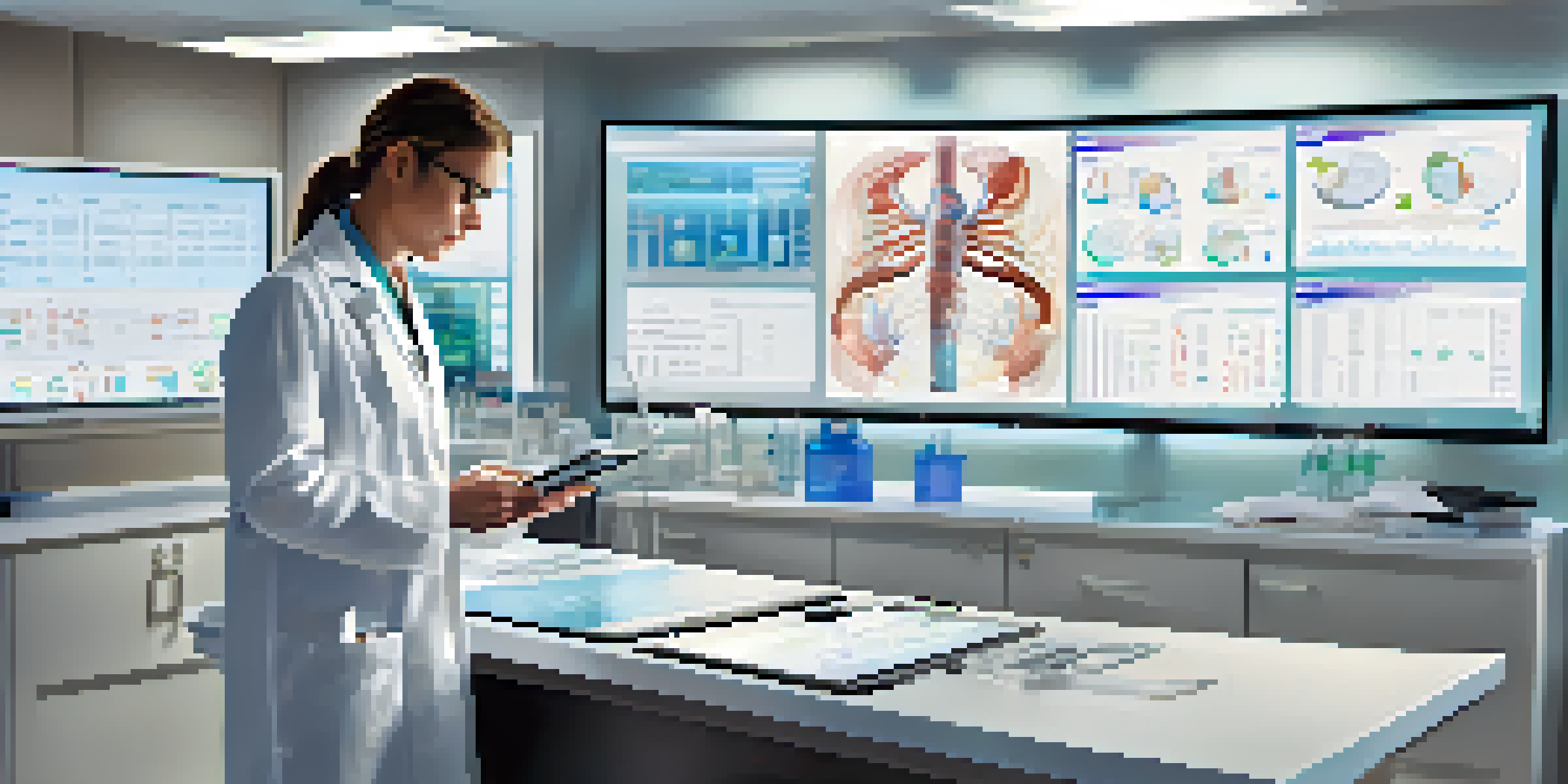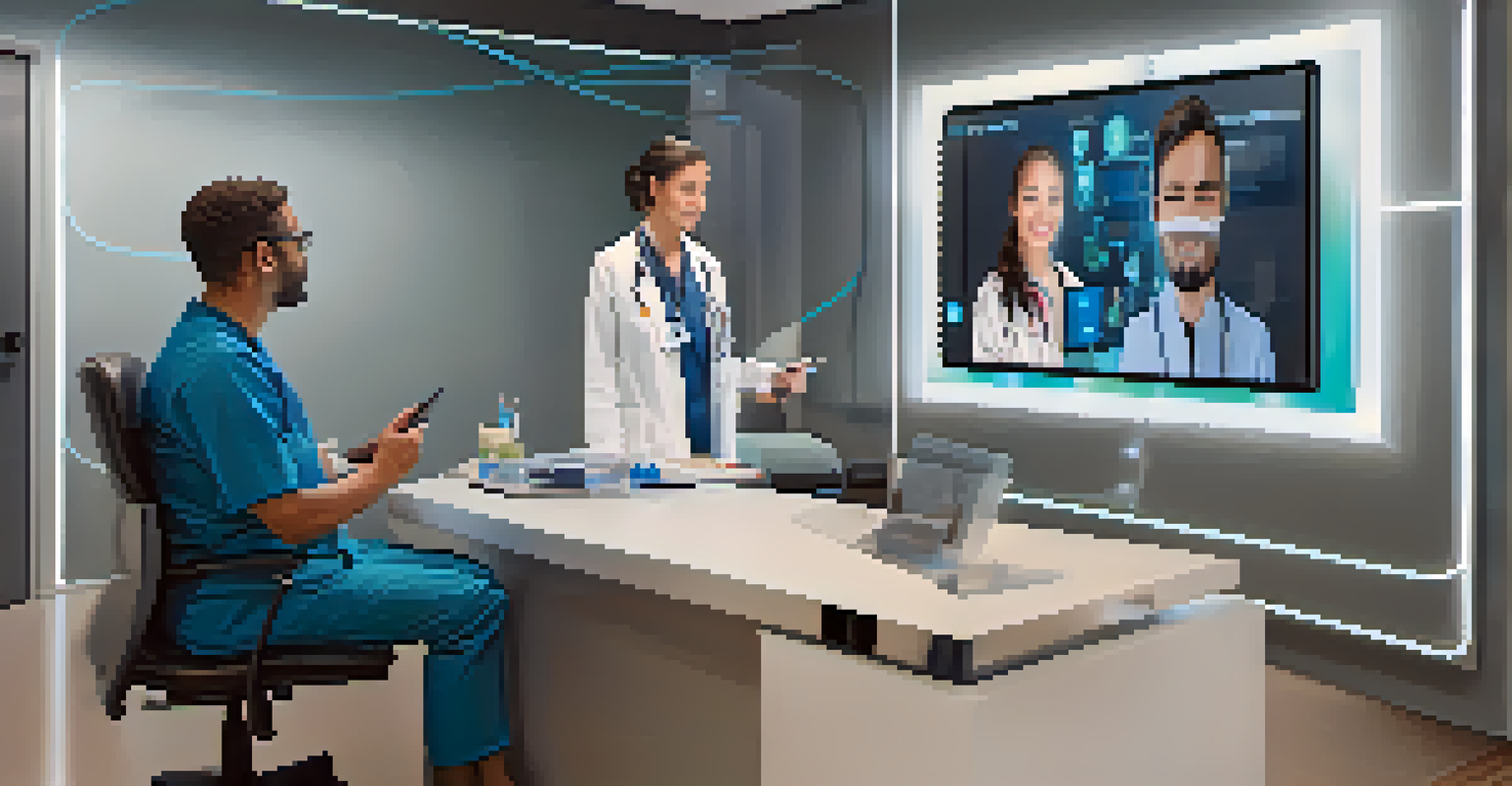Natural Language Processing in Healthcare: Applications and Benefits

Understanding Natural Language Processing in Healthcare
Natural Language Processing (NLP) is a branch of artificial intelligence that focuses on the interaction between computers and human language. In healthcare, NLP helps in analyzing vast amounts of unstructured data, such as clinical notes, to derive meaningful insights. This technology bridges the gap between human communication and machine understanding, making it a powerful tool in medical settings.
The greatest benefit of artificial intelligence in healthcare is its ability to help practitioners focus more on patient care rather than paperwork.
Imagine a doctor sifting through hundreds of patient records to find relevant symptoms or treatment histories. With NLP, this process becomes significantly more efficient, allowing healthcare providers to focus more on patient care rather than paperwork. By converting text into actionable data, NLP streamlines workflows and enhances decision-making processes.
As healthcare continues to evolve, understanding the potential of NLP is crucial for both practitioners and patients. By harnessing this technology, the industry can improve outcomes, enhance patient experiences, and ultimately save lives. Let's explore the various applications and benefits NLP brings to the healthcare landscape.
Automating Clinical Documentation with NLP
One of the most impactful applications of NLP in healthcare is automating clinical documentation. Traditionally, healthcare professionals spend a significant amount of time documenting patient interactions, which can be tedious and time-consuming. NLP streamlines this process by automatically generating notes from conversations, allowing clinicians to devote more time to patient care.

For example, when a doctor speaks to a patient, NLP technology can transcribe the conversation in real-time and populate electronic health records with relevant information. This not only saves time but also reduces the risk of errors that can occur during manual entry. As a result, healthcare providers can enhance their efficiency and accuracy.
NLP Streamlines Healthcare Workflows
Natural Language Processing automates tedious documentation tasks, allowing healthcare professionals to focus more on patient care.
Moreover, this automation can lead to improved patient outcomes. By freeing up clinicians from extensive paperwork, they can better engage with patients, leading to enhanced communication and trust. Ultimately, this shift allows for a more patient-centered approach to healthcare.
Enhancing Patient Interaction through Chatbots
NLP-powered chatbots are revolutionizing how patients interact with healthcare systems. These virtual assistants can handle inquiries, schedule appointments, and provide information about treatments—all without human intervention. This technology ensures that patients receive immediate responses to their questions, improving overall satisfaction.
Natural Language Processing has the potential to revolutionize patient care by providing immediate access to critical information and improving communication between patients and healthcare providers.
Consider a patient who has a simple question about medication side effects. Instead of waiting for a human representative to respond, an NLP chatbot can instantly provide accurate information. This not only saves time for patients but also alleviates some of the workload for healthcare staff.
Additionally, these chatbots can collect valuable data on patient needs and concerns, which can be used to refine services and improve care delivery. By leveraging NLP in this way, healthcare providers can enhance accessibility and responsiveness, ultimately fostering a more supportive environment for patients.
Improving Diagnostic Accuracy with NLP
NLP can significantly enhance diagnostic accuracy by analyzing clinical data to identify patterns and trends. For instance, it can sift through electronic health records to detect symptoms that may not be immediately obvious to healthcare providers. This capability can lead to earlier diagnoses and better treatment plans for patients.
Imagine a scenario where a patient presents with vague symptoms. An NLP system can analyze their previous medical history, lab results, and even genetic information to suggest possible diagnoses. By assisting doctors in recognizing complex patterns, NLP can make a significant difference in patient outcomes.
Chatbots Enhance Patient Interaction
NLP-powered chatbots provide immediate responses to patient queries, improving satisfaction and alleviating staff workload.
Moreover, this technology can continuously learn and adapt, improving its diagnostic capabilities over time. As more data becomes available, the accuracy and reliability of NLP systems will only increase, paving the way for a new era in precision medicine.
Facilitating Research and Data Analysis with NLP
NLP plays a vital role in healthcare research by enabling researchers to analyze large volumes of medical literature quickly. For instance, it can help identify relevant studies, extract critical information, and summarize findings, making the research process more efficient. This capability is particularly valuable in fields like oncology, where staying updated on the latest research is essential.
Imagine a team of researchers trying to keep track of thousands of studies on cancer treatments. With NLP, they can automate the extraction of relevant data, allowing them to focus on interpreting results rather than sifting through mountains of text. This not only speeds up the research process but also enhances the quality of findings.
Furthermore, NLP can assist in identifying gaps in current research, guiding future studies towards areas that require further exploration. By facilitating this type of analysis, NLP supports innovation and advancement in healthcare, ultimately benefiting patients and providers alike.
Enhancing Patient Safety through NLP Applications
Patient safety is a top priority in healthcare, and NLP can play a crucial role in enhancing it. By analyzing clinical notes and medication orders, NLP systems can identify potential errors or adverse drug interactions, alerting providers before they occur. This proactive approach helps reduce the likelihood of medical mistakes, ultimately protecting patients.
For example, if a doctor prescribes a medication that could interact negatively with a patient's existing prescriptions, an NLP alert can notify the provider in real-time. This immediate feedback not only improves patient safety but also fosters a culture of vigilance and accountability in healthcare settings.
NLP Improves Diagnostic Accuracy
By analyzing clinical data, NLP helps identify patterns that enhance diagnostic accuracy and lead to better patient outcomes.
Moreover, NLP can be used to monitor patient feedback and complaints, identifying patterns that may indicate systemic issues. By addressing these concerns promptly, healthcare organizations can take corrective actions, further enhancing patient safety and trust.
Transforming Telemedicine with NLP Technology
The rise of telemedicine has changed how healthcare is delivered, and NLP is at the forefront of this transformation. By facilitating virtual consultations, NLP tools can help providers communicate more effectively with patients, regardless of their physical location. This technology ensures that patients receive timely care, even from the comfort of their homes.
For instance, during a virtual visit, NLP systems can analyze the conversation in real-time, helping providers to focus on key issues and making the encounter more productive. This not only enhances the patient experience but also ensures that critical information is captured accurately in medical records.

Additionally, NLP can help bridge language barriers by providing real-time translation services, making healthcare more accessible to non-native speakers. By embracing NLP in telemedicine, healthcare providers can foster more inclusive and effective care delivery, meeting the diverse needs of their patient populations.
Looking Ahead: The Future of NLP in Healthcare
As technology continues to advance, the future of NLP in healthcare looks promising. With ongoing developments in deep learning and machine learning, NLP systems will become even more sophisticated, enabling more accurate interpretations of complex medical data. This evolution will empower healthcare providers to deliver personalized care tailored to individual patient needs.
Imagine a future where NLP not only assists in diagnosis but also predicts health risks based on a patient's unique genetic makeup and lifestyle. Such advancements could revolutionize preventive medicine, shifting the focus from reactive treatment to proactive health management. This shift could lead to significant improvements in population health outcomes.
Ultimately, the integration of NLP in healthcare holds the potential to enhance efficiency, accuracy, and patient satisfaction. As we look ahead, embracing these innovations will be key to building a more effective and responsive healthcare system.